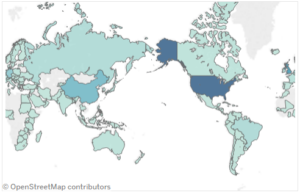Infometrics

 Informetrics relies on scientific and technical literature about Traditional and Complementary Medicine (TCM) indexed in MEDLINE, LILACS and WHOLIS database up to May/2017. Approximately 160 thousand bibliographic records were included for analysis and are distributed per article, journal, country, type of study, language, and publication year. Combinations among the elements of each group can be made to get to a list of document titles. The informetric analysis is applicable to identify any concentrations or gaps in the scientific production available on TCM in the international literature. Click here..
Informetrics relies on scientific and technical literature about Traditional and Complementary Medicine (TCM) indexed in MEDLINE, LILACS and WHOLIS database up to May/2017. Approximately 160 thousand bibliographic records were included for analysis and are distributed per article, journal, country, type of study, language, and publication year. Combinations among the elements of each group can be made to get to a list of document titles. The informetric analysis is applicable to identify any concentrations or gaps in the scientific production available on TCM in the international literature. Click here..
 WHO Traditional Medicine Strategy 2014-2023
WHO Traditional Medicine Strategy 2014-2023
The WHO Traditional Medicine Strategy 2014-2023 was developed in response to the World Health Assembly resolution on traditional medicine (WHA62.13). It aims to support Member States in developing proactive policies and implementing action plans that will strengthen the role traditional medicine plays in keeping populations healthy. (http://www.who.int/medicines/areas/traditional/definitions/en/).
The objectives of the strategy are to support Member States so that they can:
a) benefit from the potential contribution of TCM to health, wellbeing, and people-centered healthcare, and
b) promote safe and effective use of TCM through regulation and research, and by means of the inclusion of products, professionals, and practices into health systems, whenever applicable.
National policies, programs, and plans
Whenever possible, to integrate traditional medicine to national health systems upon the development and application of national policies and programs on traditional medicine.
Search in VHL
Safety, efficacy and quality
To promote safety, efficacy and quality of traditional medicine by expanding the knowledge base and providing support on regulatory and quality assurance norms.
Search in VHL
Regulation of products, practices and professionals
To promote safe and effective use of TCIM through regulation and research, and by means of the inclusion of products, professionals, and practices into health systems, whenever applicable.
Search in VHL
Integration into health systems
The increased interest in TCM demands closer integration into health systems. Normative bodies and users should investigate how TCIM can improve patient experience and population health overall. Items to improve include TCIM availability and affordability, and particularly access for the most disadvantaged people.
Search in VHL
Training and capacity-building of professionals
To improve safety and qualified practice of TCIM by means of regulation relative to the quality, quantity, accreditation, and structures to train TCIM professionals, particularly those conventional medicine practitioners that use TCIM.
Search in VHL


